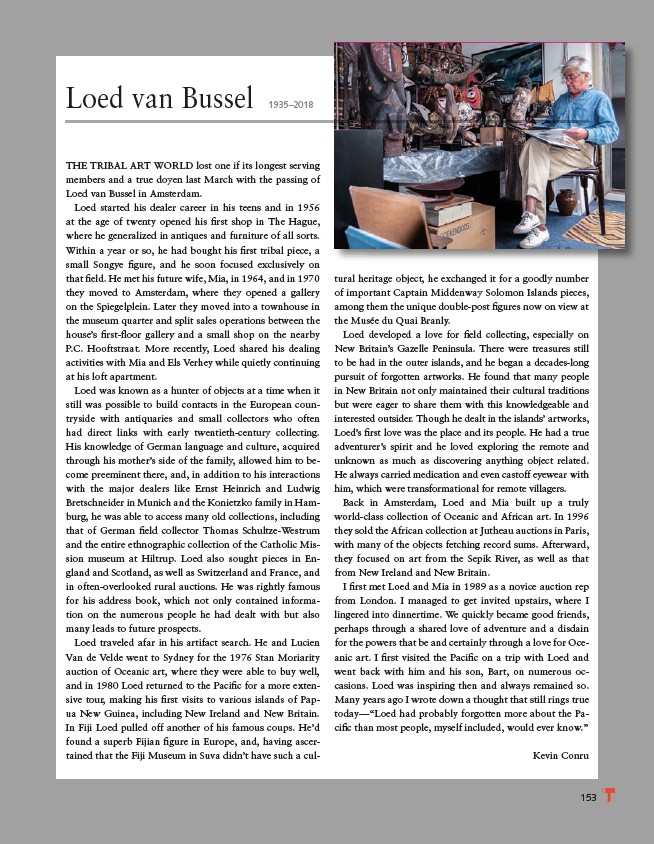
153
THE TRIBAL ART WORLD lost one if its longest serving
members and a true doyen last March with the passing of
Loed van Bussel in Amsterdam.
Loed started his dealer career in his teens and in 1956
at the age of twenty opened his fi rst shop in The Hague,
where he generalized in antiques and furniture of all sorts.
Within a year or so, he had bought his fi rst tribal piece, a
small Songye fi gure, and he soon focused exclusively on
that fi eld. He met his future wife, Mia, in 1964, and in 1970
they moved to Amsterdam, where they opened a gallery
on the Spiegelplein. Later they moved into a townhouse in
the museum quarter and split sales operations between the
house’s fi rst-fl oor gallery and a small shop on the nearby
P.C. Hooftstraat. More recently, Loed shared his dealing
activities with Mia and Els Verhey while quietly continuing
at his loft apartment.
Loed was known as a hunter of objects at a time when it
still was possible to build contacts in the European countryside
with antiquaries and small collectors who often
had direct links with early twentieth-century collecting.
His knowledge of German language and culture, acquired
through his mother’s side of the family, allowed him to become
preeminent there, and, in addition to his interactions
with the major dealers like Ernst Heinrich and Ludwig
Bretschneider in Munich and the Konietzko family in Hamburg,
he was able to access many old collections, including
that of German fi eld collector Thomas Schultze-Westrum
and the entire ethnographic collection of the Catholic Mission
museum at Hiltrup. Loed also sought pieces in England
and Scotland, as well as Switzerland and France, and
in often-overlooked rural auctions. He was rightly famous
for his address book, which not only contained information
on the numerous people he had dealt with but also
many leads to future prospects.
Loed traveled afar in his artifact search. He and Lucien
Van de Velde went to Sydney for the 1976 Stan Moriarity
auction of Oceanic art, where they were able to buy well,
and in 1980 Loed returned to the Pacifi c for a more extensive
tour, making his fi rst visits to various islands of Papua
New Guinea, including New Ireland and New Britain.
In Fiji Loed pulled off another of his famous coups. He’d
found a superb Fijian fi gure in Europe, and, having ascertained
that the Fiji Museum in Suva didn’t have such a cultural
heritage object, he exchanged it for a goodly number
of important Captain Middenway Solomon Islands pieces,
among them the unique double-post fi gures now on view at
the Musée du Quai Branly.
Loed developed a love for fi eld collecting, especially on
New Britain’s Gazelle Peninsula. There were treasures still
to be had in the outer islands, and he began a decades-long
pursuit of forgotten artworks. He found that many people
in New Britain not only maintained their cultural traditions
but were eager to share them with this knowledgeable and
interested outsider. Though he dealt in the islands’ artworks,
Loed’s fi rst love was the place and its people. He had a true
adventurer’s spirit and he loved exploring the remote and
unknown as much as discovering anything object related.
He always carried medication and even castoff eyewear with
him, which were transformational for remote villagers.
Back in Amsterdam, Loed and Mia built up a truly
world-class collection of Oceanic and African art. In 1996
they sold the African collection at Jutheau auctions in Paris,
with many of the objects fetching record sums. Afterward,
they focused on art from the Sepik River, as well as that
from New Ireland and New Britain.
I fi rst met Loed and Mia in 1989 as a novice auction rep
from London. I managed to get invited upstairs, where I
lingered into dinnertime. We quickly became good friends,
perhaps through a shared love of adventure and a disdain
for the powers that be and certainly through a love for Oceanic
art. I fi rst visited the Pacifi c on a trip with Loed and
went back with him and his son, Bart, on numerous occasions.
Loed was inspiring then and always remained so.
Many years ago I wrote down a thought that still rings true
today—“Loed had probably forgotten more about the Pacifi
c than most people, myself included, would ever know.”
Kevin Conru
Loed van Bussel 1935–2018